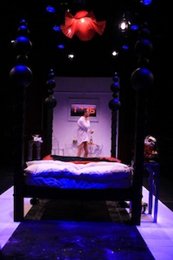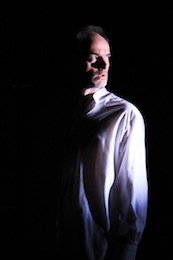A rake, a dandy, a boulevardier, a bon viveur, a collector of expensive artworks, a womaniser. Oh, and a Church of Ireland prelate: that was Frederick Hervey, Fourth Earl of Bristol, and Bishop of Derry for the last three decades of the eighteenth century. Derry writer Ken McCormack has researched Hervey’s life extensively, and distilled from it On the Subject of Love, an hour-long, one-act drama focusing on the colourful bishop’s more libidinal activities.
Initial impressions are disorienting. Kate Moylan’s set, dividing in two the intimate floor-space of Derry Playhouse, is accoutred as a modern-day boutique hotel, with bulbously decorative four-poster bed, transparent perspex furnishings, and an LED screen on which images of Hervey’s daughter Mary flash intermittently, berating him for his serial sexual improprieties. It’s not clear why this radical updating of location was necessary, but it quickly seems innocuous.

Howard Teale’s Hervey holds the stage uninterrupted for the entire sixty minutes, emerging from a crisply laundered duvet to briefly don a clerical robe, before spending the remainder of his stage-time in a night-shirt and figure-gripping red underpants. Bishop or no bishop, it isn’t a sight for the faint-hearted, particularly when Hervey flings the nightshirt off in a moment of particularly heated reminiscence, then threatens to rip away his single remaining garment.
Teale’s performance is cleverly paced and contoured, increasing in intensity as he recalls his involvements with the three women singled out as specially significant in Hervey’s emotional history. There’s an interesting tension implicit in this material – between Hervey’s religious and humanistic leanings, and an inability to govern his rawly sensual appetites – which has uncomfortable contemporary resonances, yet goes oddly uninterrogated in McCormack’s script.
We get the bare facts, some wrangled soul-searching from the priapic prelate, an anguished dose of outraged daughter on the video, then it’s onward to the next quixotic episode. Hervey’s own capacity to self-analyze seems seriously limited, his inclination to exculpate himself highly developed. That makes it difficult for McCormack to show any interesting development in the character, because essentially there isn’t any.
This lack of cumulative purpose in the narrative structure of the play means that when death finally comes to Hervey, it comes inconclusively. There’s no sense of difficult questions having been addressed and answered: to the end the impression is of a life that was messily episodic, and consistently self-indulgent. You can’t admire the character; it’s more than possible to actively dislike him.
 That this may not be entirely fair historically is hinted at in the piped news bulletin which announces Hervey’s death at the play’s conclusion. Here his better side is hinted at: the public works, the numerous philanthropic activities. But the fade-out of the announcement is made prematurely, as though the better angels of Hervey’s complicated nature are somehow less interesting and relevant than the sybaritic, fleshly tendencies highlighted in McCormack’s writing. The opportunity to frame the Bishop’s life within a broader social and psychological context again seems deliberately avoided.
That this may not be entirely fair historically is hinted at in the piped news bulletin which announces Hervey’s death at the play’s conclusion. Here his better side is hinted at: the public works, the numerous philanthropic activities. But the fade-out of the announcement is made prematurely, as though the better angels of Hervey’s complicated nature are somehow less interesting and relevant than the sybaritic, fleshly tendencies highlighted in McCormack’s writing. The opportunity to frame the Bishop’s life within a broader social and psychological context again seems deliberately avoided.
Incidental music, strongly French in idiom with whiffs of Fauré and Debussy, is provided by the young American composer Adam Burnette, who presides at the piano. Supporting him are three white-gowned cellists (Lizzy Donaghy, Elaine McCann, Naoimh Simpson), perched on circular podiums, playing either singly or in combination. Evocatively lit by Moyra D’Arcy, and located at vantage points around the stage area, they’re like sirens summoning the Bishop to enmesh himself in the webs of amorous intrigue and covert sensuality he found so irresistible.
Caitríona McLaughlin’s direction is generally sure-footed, though more terracing and variation of dynamics in Howard Teale’s delivery of what is essentially an hour-long monologue would have sharpened focus on the forces struggling for dominion in Hervey’s conflicted inner nature.
Despite the fine production values, however, it’s ultimately difficult to fathom what On the Subject of Love is actually getting at. As a series of picaresque adventures in the skin trade, it’s only moderately interesting. As an examination of how the world, the flesh and the devil conspire to make true devoutness problematic, it never really gets started. As a portrait of a historical individual, it’s selective and arguably a tad salacious. Are we meant, finally, to simply marvel that Derry-Londonderry once boasted "the most worldly, most eccentric, most talked-about priest in the Church of Ireland", as one commentator put it?
Ken McCormack is currently completing Sunset in Albano, a fictionalised version of On the Subject of Love. The novel will probably prove a better medium for filling in the human detail on the multi-faceted Bishop Hervey, whose life in the play emerges as pinched, blinkered, and nigglingly inconsequential.
Terry Blain is an arts journalist and cultural commentator, contributing regularly to BBC Music Magazine, Opera Britannia, Culture Northern Ireland and other publications.